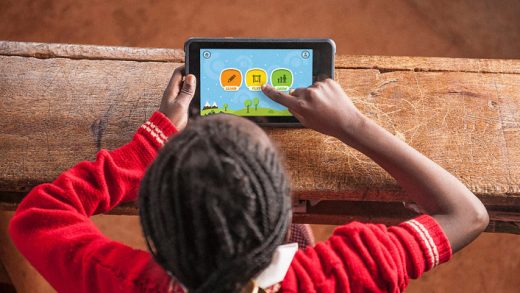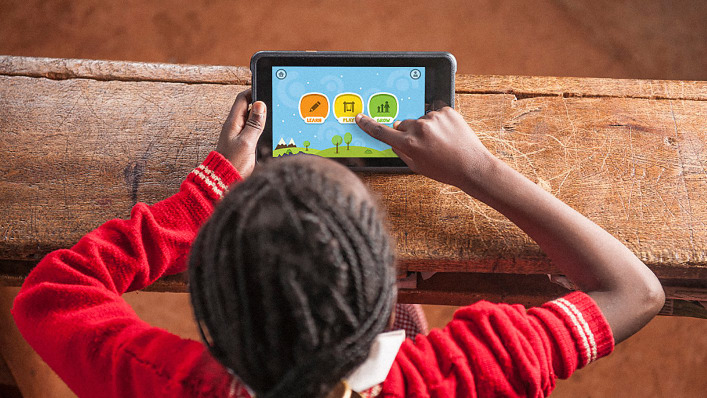A Rugged Box Of Education Tech With Its Own Internet Connection, And Other World Changing Developing World Technology
A lot of technologists have worked to wire up the world’s classrooms, but few can claim this: the ability to wire up more or less any school anywhere. That’s what the KioKit does, and it’s one reason the Kenyan-born project won the developing world technology category in this year’s World Changing Ideas Awards (you can see the full list of finalists below).
Developed by a dedicated group in Nairobi’s “Silicon Savannah,” the KioKit is an electronic school in a hardened Pelican case. It contains 40 tablets, a power source and internet connectivity (from the multi-functional BRCK), and plenty of content, including digital textbooks, language quizzes, and Khan Academy modules. It’s robust, flexible and designed for any context, including humid and dusty environments in Africa, and classrooms full of playful and destructive kids.
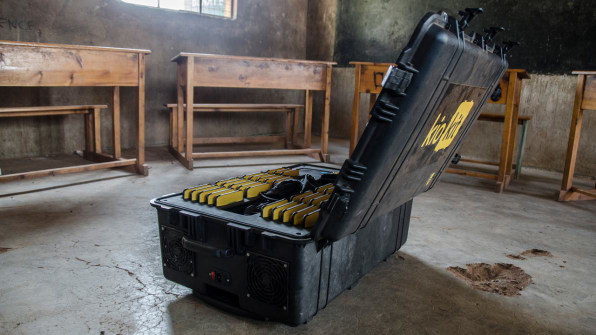
“BRCK started as a company that says ‘why do we keep using Western technology that’s designed for and by someone else?,’” says Nivi Sharma, president of BRCK Education, the startup behind the kit. “We thought ‘why are we using [foreign technology] in Africa rather than developing it on our own?’”
Before her current role, Sharma launched another startup, eLimu, which digitizes the Kenyan curriculum. She’s seen how importing computers developed in easier-going environments can lead to problems. The tablets she bought from China and the U.S. broke down once they were exposed to Kenyan conditions. The KioKit tablets, by contrast, are fully ruggedized: water and dust resistant, and designed to withstand a hard fall from desk-height.
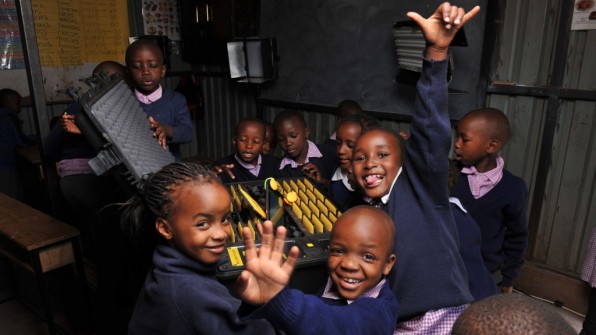
“No school in Kenya has a computer in every classroom, so these devices need to be plugged in and unplugged and moved from one classroom to another,” she says. “They’re taking a real beating that they maybe wouldn’t in other parts of the world.”
The KioKit is based around the BRCK, an all-in router, server, and battery. It connects to WiFi if it’s available, but also delivers content to the tablets on an offline network. The tablets can be charged enough to get through an eight-hour day (so there are no worries about power failures) before they’re recharged overnight. And the BRCK contains a SIM card slot, allowing access to a mobile network. As new content is made available, it updates automatically when possible, appearing simultaneously across the tablets.
When you switch on the tablets, they immediately go to the KioKit’s walled garden of content, Sharma says. There’s no need to open apps or browsers, or for teachers to deliver elaborate instructions. The aim, she says, is to maximize teaching time and minimize “friction and disruption between when the bell rings and the learning begins.”
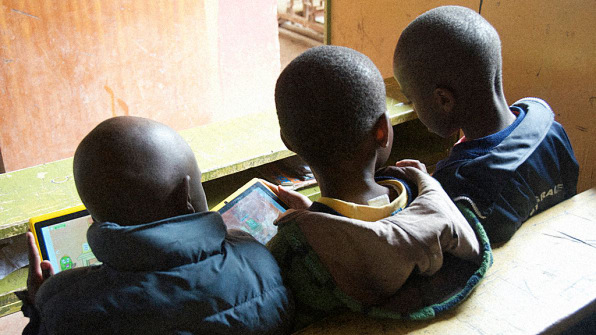
The content itself is divided into three sections: “learn,” “play” and “grow.” Play includes chess, math and memory games, plus an introductory programming language game (“Scratch Junior”). The Grow section is about life skills and advice, covering everything from environmental topics to menstruation. There’s also an extensive library of ex-copyright classic books.
Now in 40-plus schools in Kenya, the KioKit has since been exported to 13 other countries, including Mexico and the Solomon Islands. Schools can install their own local content, depending on curriculum needs and languages.
Down the line, BRCK (a for-profit company) may develop a larger tablet with a keyboard, so students can create content as well as consume it. It would be great, says Sharma, if students could write more easily or develop their own code. The KioKit already opens up a lot of knowledge wherever the need, and it promises to do even more in the years ahead.
Here’s more about the finalists in the developing world technology category:
DoctHERs
DoctHERs
DoctHERS is a telemedicine project in Pakistan that makes use of a big neglected resource: thousands of trained female doctors who’ve stopped working after they’ve got married. Patients visit neighborhood clinics, get a basic exam from a nurse, then consult with an at-home women doctor via an internet connection. The result is more doctors in circulation and less wasted medical training.
Charity: Water sensor project
Charity: Water
New York nonprofit Charity:Water has dug thousands of water wells across the developing world, but it wanted a better way to track their performance. The Google.org-funded project puts sensors on every site, measuring flow rates and generating daily reports. Now each well now has its own profile page, complete with data and testimonies, allowing better maintenance and more transparency for donors.
Sato, Lixil
Japanese toilet giant Lixil has sold more than one million SaTo (“Safe Toilets”) in Africa, raising hygiene standards in places without sewers. The toilet has a counterweighted trap door that opens to let poop and pee down, separating user and waste and reducing smells. Underneath the pan is a half-inch cup that fills with water creating an airtight seal. The SaTo is cheap and practical and now part of its own division at the company.
Fresh Fit
Sanergy
Founded by M.I.T. graduates, Sanergy has built a business providing basic, hygienic sanitation in Nairobi’s slums. Its Fresh Fit toilets separate poo and pee, allowing the former to be collected and turned into agricultural fertilizer. Customers lease the toilet for their homes for about $6 per month (including collection) and several franchisees are now developing their own micro-enterprises selling the design.
Tricog
Tricog Health Services
This Bangalore-based health tech company installs ECG heart devices in primary and secondary clinics, helping speed up diagnosis of conditions leading to heart attacks. Within minutes, trained specialists have analyzed a person’s reading and sent a consultation to the first doctor’s phone. By saving time to diagnosis, Tricog is helping to save lives.
Neopenda
Neopenda
Originally developed by students at Columbia University, the Neopenda cap tracks a baby’s vital signs including heart and respiratory rate, blood oxygen saturation and temperature, sending data wirelessly to a nurse’s tablet. The device is getting its first clinical pilot studies in 2017 and the for-profit social enterprise hopes to sell into hospital systems and NGOs in under-resourced places, including in East Africa.
PlayPallets
PlayPallets
PlayPallets are, as the name suggests, pieces of sports equipment rendered from shipping pallets. Aimed at refugee camps, the kits can be built into basketball net stands, soccer goals, skateboard ramps, and cricket stumps. PlayPallets wants every kid to be able to play and using pallets makes shipping easier.
Pregnancy High Risks Toolkit
Philips
Philips’s pre-natal kit contains a battery-free fetoscope helping midwives and birth attendants to listen for heart irregularities inside the womb.
World Food Programme Innovation Accelerator
World Food Programme
Furthering its reach beyond aid distribution, the World Food Program is launching an accelerator to empower impact startups. Projects so far include the very successful ShareTheMeal crowdfunding app, Agriup, an app that gives smallholders farmers market pricing and weather information and Building Blocks, a blockchain-based system for cash-based transfers.
M-Tiba
PharmAccess
Modeled after the blockbuster M-Pesa mobile money system in Kenya, M-Tiba is a mobile savings account for health care. It lets individuals put away money for emergencies or for aid groups to disburse funds directly and efficiently. Since its launch in June 2016, more than 140,000 people have registered on the platform and at least 300 health care providers have said they’ll accept payment through the service.
RippleNami
RippleNami
This California-based startup has a cloud-based, map-making tool aimed at relief agencies and other groups working in remote places. By mapping resources and emergencies, it can help distribute aid more efficiently, for example. “RippleNami delivers real-time information on any device, empowering users to solve problems, make critical decisions and collaborate like never before,” the company says.
PermaNet
Vestergaard
Insecticidal bed nets prevent malaria infections, but the main chemical used for treating net is losing its resistive power. Based in Switzerland, Vestergaard makes a “long-lasting insecticidal net with increased efficacy against insecticide resistant mosquitoes.”
Be
B-Change Group
This app is aimed at Southeast Asia’s marginalized communities and their allies. It offers information about LGBTI-friendly service providers and safe meet-up methods.
Prosthetics in a box
Not Impossible Labs
From Mick Ebeling’s impact technology design shop, a modular kit for building affordable, workable replacement limbs. The box weighs just two to three pounds but allows someone with minimal training to create a prosthetic in under two hours.
Solar-powered water generator
SunToWater Technologies
Looking a bit like a standard home air conditioner, the Water Generator extracts humidity from the air and converts it into pure drinking water. Using solar power, the device pulls in air and pushes it over a salt desiccant. According to the company that makes the unit, it works even in the driest and most arid environments, making it a good bet for droughts and long hot spells.
Drinkwell
Drinkwell
Drinkwell franchises water filtration technology to villages in South Asia. In this way, it helps guard against contamination (including arsenic and bacteria like E.coli) and offers entrepreneurial opportunities for local people. The franchise model makes local people responsible for the service, increasing chances the filter will be maintained.
On-the-Go H2O
Ford Motor Co.
Two Ford engineers have developed a way to collect condensation from vehicle air conditioners and turn it into drinkable water. John Rollinger and Doug Martin say a typical car can produce 24 ounces of water per hour–about three cups. Potentially, just half the U.S. fleet could produce 18 million gallons of fresh water a day, they say, though Ford currently has no plans to commercialize the idea.
Learn about the winner of the developing world technology category of Fast Company’s 2017 World Changing Ideas Awards–and the other innovative finalists.
A lot of technologists have worked to wire up the world’s classrooms, but few can claim this: the ability to wire up more or less any school anywhere. That’s what the KioKit does, and it’s one reason the Kenyan-born project won the developing world technology category in this year’s World Changing Ideas Awards (you can see the full list of finalists below).
Fast Company , Read Full Story
(39)

